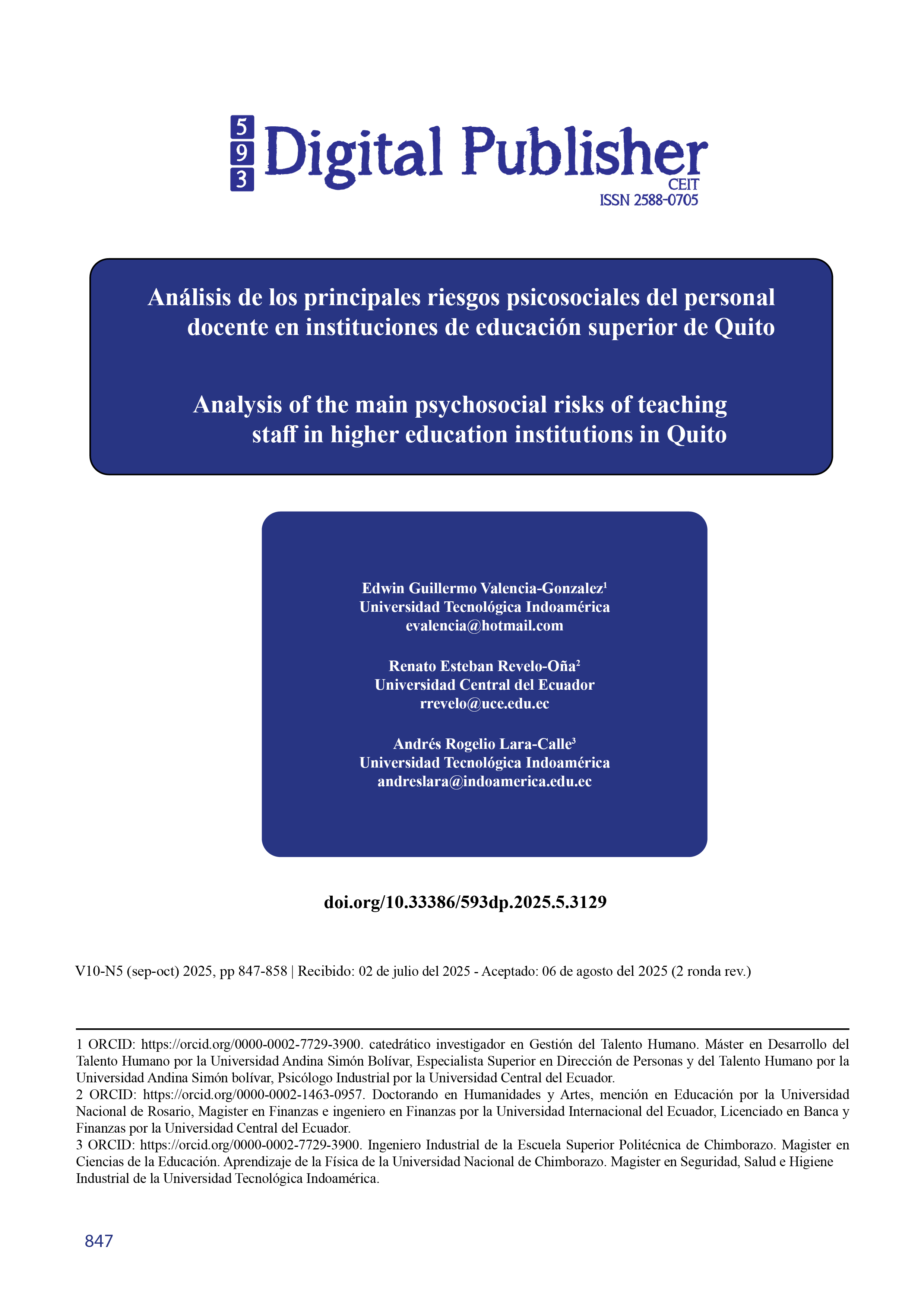Analysis of the main psychosocial risks of teaching staff in higher education institutions in Quito
Main Article Content
Abstract
This study analyzes the main psychosocial risks affecting teaching staff in higher education institutions in Quito, a sector where staff well-being directly impacts educational quality. The main objective was to identify the predominant risk factors, describe their impact levels, and understand how they affect the work environment. The research was conducted using a quantitative approach with a descriptive, cross-sectional design, applying the psychosocial risk assessment questionnaire from Ecuador's Ministry of Labor to a sample of teachers. The results reveal that the most critical dimensions are support and backing, where 68% of participants perceive a medium or high risk, and workplace harassment, with a concerning 28% at a high-risk level. Likewise, workload and pace (55% at medium risk) and difficulties with recovery and disconnection outside of working hours (19% at high risk) emerged as significant factors. It is concluded that psychosocial risks are a frequent problem in the studied teaching environment, highlighting the need to implement focused intervention strategies, especially in improving institutional support, leadership culture, and harassment prevention.
Downloads
Article Details

This work is licensed under a Creative Commons Attribution-NonCommercial-ShareAlike 4.0 International License.
1. Derechos de autor
Las obras que se publican en 593 Digital Publisher CEIT están sujetas a los siguientes términos:
1.1. 593 Digital Publisher CEIT, conserva los derechos patrimoniales (copyright) de las obras publicadas, favorece y permite la reutilización de las mismas bajo la licencia Licencia Creative Commons 4.0 de Reconocimiento-NoComercial-CompartirIgual 4.0, por lo cual se pueden copiar, usar, difundir, transmitir y exponer públicamente, siempre que:
1.1.a. Se cite la autoría y fuente original de su publicación (revista, editorial, URL).
1.1.b. No se usen para fines comerciales u onerosos.
1.1.c. Se mencione la existencia y especificaciones de esta licencia de uso.
References
Acosta-Prieto, J., Avila-Sánchez, P., Contreras-Rodríguez, M., Dueñas-Reyes, E., Cuello-Cuello, Y., y Matos-Guerrero, A. (2024). Incidencia de tecnoestrés como riesgo psi-cosocial en docentes de una Facultad de Ingeniería Industrial. Revista Médica Elec-trónica, 46(1), 1-17. http://scielo.sld.cu/scielo.php?pid=S1684-18242024000100136&script=sci_abstract&tlng=pt
Asamblea Nacional de la República del Ecuador. (2015). Ley orgánica de seguridad y salud en el trabajo. Registro Oficial No. 180. https://www.trabajo.gob.ec/wp- con-tent/uploads/downloads/2015/07/LOSST.pdf
Cedillo, K., y Guerrero, D. (2025). Riesgos psicosociales en docentes de la Facultad de Ciencias médicas de la Universidad de Cuenca, 2024 – 2025 (Tesis de pregrado). Universidad de Cuenca. https://dspace.ucuenca.edu.ec/items/a8f00fb8-301f-4fcc-90ac-72e260471bb3
Dávila, T. (2019). Empleo informal. Evolución teórica y criterios para su estimación deriva-dos de la Organización Internacional del Trabajo (OIT). https://dialnet.unirioja.es/servlet/articulo?codigo=7494320
García, M. (2019). Historia, Trabajo y Sociedad. https://1mayo.ccoo.es/c91869abb3d4bfc7891bad2a3171b5da000001.pdf
Gil Álvarez, J. L., León González, J. L., y Morales Cruz, M. (2017). Los paradigmas de investigación educativa, desde una perspectiva crítica. Revista Conrado, 13(58), 72-74. https://conrado.ucf.edu.cu/index.php/conrado/article/view/476/510
Gutiérrez, A. y Viloria, J. (2014). Riesgos Psicosociales y Estrés en el ambiente laboral. https://www.redalyc.org/pdf/817/81730850001.pdf
Gutiérrez-Hernández, M., Maldonado-Macías, A., y Gutiérrez-Hernández, P. (2025). Im-pacto de los factores de riesgo psicosocial en la satisfacción laboral en docentes uni-versitarios. Revista Electrónica Científica de Investigación Educativa, 9(1), 1-16. https://mail.rediech.org/ojs/2017/index.php/recie/article/view/2397/2269
Hernández-Sampieri, R., Fernández-Collado, C., y Baptista-Lucio, P. (2017). Alcance de la Investigación. https://sga.unemi.edu.ec/media/archivocompendio/2021/08/12/archivocompendio_ 202181223225.pdf
Hernández-Sampieri, R., y Mendoza, C. (2020). Metodología de la investigación: las rutas cuantitativa, cualitativa y mixta. Mcgraw-hill. https://d1wqtxts1xzle7.cloudfront.net/64591365/Metodolog%C3%ADa_de_la_inves tigaci%C3%B3n._Rutas_cuantitativa cualitativa_y_mixta- li-bre.pdf?1601784484=&response-content- disposi-tion=inline%3B+filename%3DMETODOLOGIA_DE_LA_INVESTIGACI ON_LAS_RUTA.pdf&Expires=1689045606&Signature=NBmEcOXZ3U0TECNoG N5Fe4i7nKrUmzESc5KZLWd34X55eRXyNvwgCnksjOds-
KVALYOr1y3ZAELvKlt16EwVCWOuLzJ1-1U6gA0RRnKnN~a13o6qH2tJIHP- BV18sQvZivn-9q56VvoIkVGcCbGZDQzruhBDnuGdM5vVN43HpxkQxjcnN- tR~tzTwPYQG6sFfy0OC0Kx41Ue2jmJIQ4KN1P74K~zbhiGq~hRYjpDJV6r3zllLv uRyAvfZw5ztaFiEwPP- BnQ9UMieZd58lp7MgSbIyHhKOcxXkUULeRoFli6k2XiTlzBSlESPX74QoWh- j6KhZvtWqV1Q5JP7Er2gw &Key-Pair-Id=APKAJLOHF5GGSLRBV4ZA
Mayol Legaz, J. (2016). Estudio de los riesgos psicosociales en el personal docente de un centro de educación especial. http://dspace.umh.es/bitstream/11000/8425/1/Mayol%20Legaz_%20Josefa%20TF M.pdf
MINISTERIO DEL TRABAJO DIRECCIÓN DE SEGURIDAD, SALUD EN EL TRA-BAJO Y GESTIÓN INTEGRAL DE RIESGOS (2018). Guía para la aplicación del cuestionario de evaluación de riesgo psicosocial. https://www.trabajo.gob.ec/wp- content/uploads/2012/10/GU%C3%8DA-PARALA-APLICACI%C3%93N-DEL- CUESTIONARIO-DE-EVALUACI%C3%93NDE-RIESGO- PSICOSO-CIAL.pdf?x42051
Moreno, Janeth Elizabeth Salvador. (2019). Compromiso Organizacional y Riesgos Psicoso-ciales. Revista San Gregorio, 3(5), 157-173. https://doi.org/10.36097/rsan.v1i35.1107
Moreno-Jiménez, B. (2011). Factores y riesgos laborales psicosociales: conceptualización, historia y cambios actuales. Medicina y Seguridad del trabajo, 57, 4-19. https://scielo.iscii.es/scielo.php?pid=S0465546X2011000500002&script=sci_arttext& tlng=en
Ochoa, C. (2015). Muestreo no probabilístico: muestreo por conveniencia. Recuperado de https://www. netquest. com/blog/es/blog/es/muestreo-por-conveniencia.
Palella, S., & Martins, F. (2006). Metodología de la investigación cualitativa. http://gc.scalahed.com/recursos/files/r161r/w23578w/w23578w.pdf
Patton, M. (1990). Qualitative evaluation and research methods. Newbury Park: Sage.
Pérez Bilbao, J., y Nogareda Cuixart, C. (2012). Factores psicosociales: metodología de evaluación. https://documentacion.fundacionmapfre.org/documentacion/publico/es/bib/139925.do
Quinde, A. (2023). Dimensiones de los riesgos psicosociales en docentes y administrativos de la Universidad Católica de Cuenca. Vincula Tégica EFAN, 9(3). 1-12. https://vinculategica.uanl.mx/index.php/v/article/view/223
Ramos, C. A. (2015). Los paradigmas de la investigación científica. https://revistas.unife.edu.pe/index.php/avancesenpsicologia/article/view/167/159
Sierra, E. (2021). Delimitación del concepto de riesgo psicosocial en el trabajo. https://revistas.uasb.edu.ec/index.php/foro/article/view/2471




